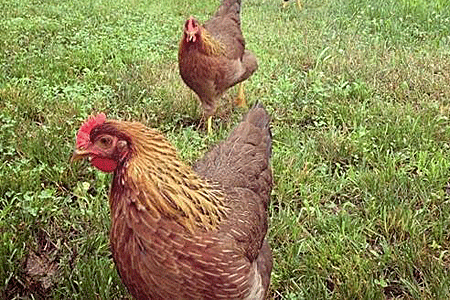
Some chicken breeds thrive better on forage compared to others. Breeds that have been kept in confinement for many generations generally forage less aggressively than breeds that have continued to exercise their foraging instinct. If you want a low-maintenance flock, and you have space for them to roam, consider these chicken breeds that are exceptional foragers.
Buckeye — Developed in Ohio, this dual-purpose farmstead breed is especially docile and winter hardy.
Dominique — This Canadian breed was brought to the United States by early settlers as a winter hardy dual-purpose farmstead breed.
Fayoumi — This ancient breed, developed in Egypt, excels in flying and is particularly disease resistant.
Hamburg — Of Turkish origin, this winter hardy breed was further developed in Europe as an excellent forager and capable flier.
Leghorn — Developed in Italy, this breed efficiently converts feed to eggs and is heat tolerant; the brown variety is best suited to foraging.
Minorca — This old breed, originating in Spain, does well in hot climates but is not cold hardy because its large comb and wattles freeze easily.
Old English Game — This ancient breed is active and hardy and is often seen foraging along rural roads or roosting in trees.
Red Jungle Fowl — An ancestor of all domestic chickens, jungle fowl originated in forested areas of southern Asian and still retain their feral nature.
Spitzhauben — Originating in the Appenzeller canton of Switzerland, these chickens are active, alert, and outstanding fliers.
Sumatra — An ancient breed native to the island of Sumatra, this hardy, active, alert chicken is extremely capable as a flier and high jumper.
Welsumer — Developed in Holland, this active, winter hardy breed is especially good at foraging for insects.
Where a flock will have the benefit of forage, choose a breed suitable for your prevailing climate. Feather colors other than white blend more easily into the surroundings, offering foraging birds protection from predators. Another predator resistant feature is the ability to fly well. Protective trees or constructed shelters not only offer further protection from predators, but also encourage the chickens to forage away from their home shelter, reducing their impact on vegetation around the doorway.
How much of the chickens’ diet they will obtain by foraging depends on the quality of the forage and the number of chickens competing for it. In addition to tender greens, chickens eat seeds and insects, and sometimes mice, frogs, and snakes. But under normal conditions, whatever nutrition they derive from the forage is unlikely to replace a significant percentage of their regular ration. The chief benefits of selecting chicken breeds that are exceptional foragers are that they will enjoy increased dietary variety, get healthful exercise and fresh air, and be exposed to a reduced concentration of parasitic worms.
And that’s today’s news from the Cackle Coop.
Gail Damerow, author, The Chicken Encyclopedia

